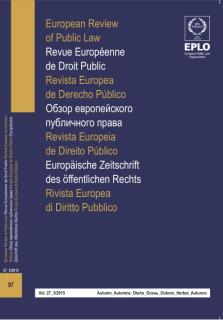
Jurisprudence
Constitutional / Constitutionnelle
2014
PORTUGAL
ALEXANDRE SOUSA PINHEIRO
Professor at the University of Lisbon, School of Law
ALEXANDRA GONÇALVES MARQUES
Lawyer; Master in Tax Law by the University of Lisbon, School of Law
MARIANA MELO EGÍDIO
Teaching Assistant at the University of Lisbon, School of Law;
PhD candidate at the University of Lisbon, School of Law
In 2014, the Portuguese Constitutional Court issued 1738 decisions. Most of the Court's decisions refer to concrete constitutional control, although abstract constitutional control, in its subsequent or successive (a posteriori) form, registered an increase in comparison to preceding years. However, the number of decisions on strictly political matters (v.g. elections, referenda, political parties) decreased. Also in accordance with the line followed in previous years, the most significant decisions regarded public servants and pensioners and summoned the application of constitutional principles related to substantive issues of equality/non-discrimination and proportionality. Tax law, penal issues, civil liberties, family law and regional autonomy also gave origin to important decisions of the Court. The decisions were selected considering both the subject in itself and its relevance for the international reader.
En 2014, la Cour constitutionnelle portugaise a rendu 1.738 arrêts. La plupart concernent le contrôle constitutionnel concret, bien que le contrôle constitutionnel abstrait, sous sa forme subséquente ou successive (a posteriori), ait progressé par rapport aux années précédentes. Cependant, le nombre d'arrêts en matière strictement politique (élections, référendums, partis politiques, par exemple) est en baisse. Conformément aussi avec la ligne suivie au cours des années précédentes, les arrêts les plus importants ont concerné les employés et pensionnés de la fonction publique et ont exigé l'application des principes constitutionnels liés aux problèmes essentiels d'égalité/non-discrimination et de proportionnalité. Le droit fiscal, certaines questions pénales, les libertés publiques, le droit de la famille et l'autonomie régionale ont aussi été à l'origine d'arrêts significatifs de la Cour. Les arrêts ont été sélectionnés en fonction de leur objet et de la pertinence de celui-ci pour le lecteur étranger.





















